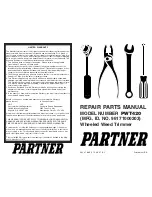
GB
- 18 -
will then begin to
fl
ash.
3. Insert the battery pack into the charger.
4. In the section entitled „Charger indicator“
there is a table with an explanation of the LED
display on the charger.
The battery pack can heat up slightly during char-
ging. This is normal.
If the battery pack fails to charge, please check:
•
whether there is a voltage at the mains power
socket;
•
whether there is good contact at the charging
contacts.
If the battery pack still fails to charge, please send
•
the charging unit
•
and the battery pack
to our customer service center.
To ensure that items are properly packaged
and delivered when you send them to us,
please contact our customer service or the
point of sale at which the equipment was
purchased.
When shipping or disposing of batteries and
cordless tools, always ensure that they are
packed individually in plastic bags to prevent
short circuits and
fi
res.
To ensure that the battery pack provides long ser-
vice, you should take care to recharge it promptly.
You must recharge the battery pack when you
notice that the performance of the device drops.
Never allow the battery pack to become fully di-
scharged. This will cause it to develop a defect.
Battery capacity indicator (Fig. 6a)
Press the battery capacity indicator switch (item
A). The battery capacity indicator (item B) shows
the charge status of the battery using 3 LEDs.
All 3 LEDs are lit:
The battery is fully charged.
2 or 1 LED(s) are lit:
The battery has an adequate remaining charge.
1 LED
fl
ashes:
The battery is empty, recharge the battery.
All LEDs blink:
The battery temperature is too low. Remove the
battery from the equipment, keep it at room tem-
perature for one day. If the fault reoccurs, this me-
ans that the rechargeable battery has undergone
exhaustive discharge and is defective. Remove
the battery from the equipment. Never use or
charge a defective battery.
6. Operation
Switching ON/OFF
The hedge trimmer is equipped with a two-
handed safety switch. It works only when one of
the switches on the steady grip (Fig. 4c/Item 3a)
is pressed with one hand and the switch (Fig. 4c/
Item 4a) on the handle is pressed with the other
hand.If either switch is released, the cutters will
stop moving. Please watch out for the cutters as
they slow down to a standstill.
Notes for use
•
A hedge trimmer can be used to cut shrubs
and bushes as well as hedges.
•
To obtain the best cutting results, hold the
hedge trimmer so that the cutter teeth are
at an angle of approx. 15° in relation to the
hedge (see Fig. 7).
•
The twin-bladed cutters rotate in opposite
directions, thus enabling cutting in both direc-
tions (see Fig. 8).
•
To ensure that you cut the hedge to a level
height, we recommend tying a guide line of
string or similar along the hedge. Cut off all
branches that protrude beyond the guide line
(see Fig. 9).
Warning!
Be particularly attentive when cutting
along the guide line. Do not cut through the guide
line. This could get entangled in the blades and
lead to injuries or damage to property.
•
Cut the sides of the hedge with curve-shaped
movements from the bottom up (see Figure
10).
What to do if the blade gets blocked
1. Stop the equipment.
2. Remove the battery.
3. Remove the jammed material from the blade
(wear work gloves to prevent injury when you
do so).
After using
1. Switch
o
ff
the equipment.
2. Remove the battery.
3. Allow the equipment to cool down and then
store it out of children’s reach.
Anl_ARCURRA_18_55_SPK13.indb 18
Anl_ARCURRA_18_55_SPK13.indb 18
13.05.2022 10:57:07
13.05.2022 10:57:07
















































